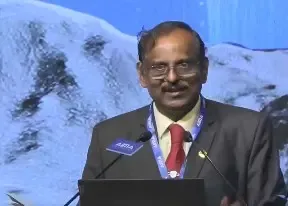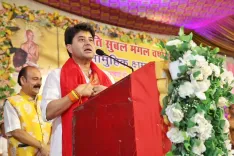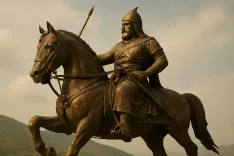Is India Set to Achieve 10 More World Records in Space Missions?

Synopsis
Key Takeaways
- ISRO has set nine world records in space missions.
- Upcoming missions may achieve 8-10 additional records.
- Chandrayaan-3 successfully landed near the lunar South Pole.
- ISRO's LVM3 cryogenic stage achieved several world records.
- Cost management is a key focus for ISRO's project planning.
New Delhi, Sep 9 (NationPress) India has successfully established nine significant world records in its space endeavors and is poised to add approximately 8-10 more, revealed Chairman V. Narayanan during his address at the 52nd National Management Convention.
The Chandrayaan missions 1, 2, and 3, the Mars Orbiter Mission, and advancements in cryogenic engine technology are among the notable records set since 2008, according to Narayanan.
In 2008, India made history with the Chandrayaan-1 mission, becoming the first nation to identify water molecules on the lunar surface, sub-surface, and exosphere—a finding later corroborated by NASA’s Sofia Observatory.
With the Mars Orbiter Mission in 2014, India became the first country to successfully reach the Red Planet on its inaugural attempt. The PSLV-C37 mission in 2017 achieved a remarkable milestone by launching 104 satellites in a single mission.
“The Chandrayaan-2 mission, launched in 2019, equipped us with the best camera (the orbiter high-resolution camera) currently orbiting the Moon,” Narayanan stated.
On August 23, 2023, Chandrayaan-3 marked a historic achievement, making India the first nation to land a spacecraft near the lunar South Pole.
“Chandrayaan-3 also conducted the first in situ measurement of the lunar surface and near-surface environment in the Moon’s Southern Polar region,” the Chairman added.
Additionally, between December 2014 and June 2017, India set three world records in the development of the LVM3 cryogenic stage.
“We achieved the development, qualification, and first flight using just three engines, compared to the world record of four-11 engines,” Narayanan noted.
ISRO completed the maiden flight of LVM3 with a cryogenic stage in just 28 months, significantly faster than the 37 to 108 months taken by other countries, he pointed out.
The hot stage test was completed in a record time of just 34 days, compared to other nations, which took between 64 days and 10 months.
“We are planning to establish 8-10 more world records,” Narayanan emphasized.
Discussing the economical approach of these missions, the ISRO chief remarked: “We are highly cost-sensitive; each test is thoroughly analyzed and discussed before authorization, which helps lower launch costs.”
He also mentioned other achievements, such as launching over 4,000 rockets from Indian soil and successfully deploying 133 satellites.
On ISRO's pivotal role in enhancing India’s economy and security, Narayanan stated that ISRO is enhancing the nation’s technological prowess, fostering localization and technology transfer, and promoting space entrepreneurship to position India as a global leader in space.
“The journey of our space program, from bullock carts and bicycles to our current achievements, is truly remarkable. By 2040, we aim to land a human on the Moon, where they will raise the Indian flag and announce that India is on the path to becoming a developed nation. This is the message we wish to convey through this historic milestone,” he concluded.





